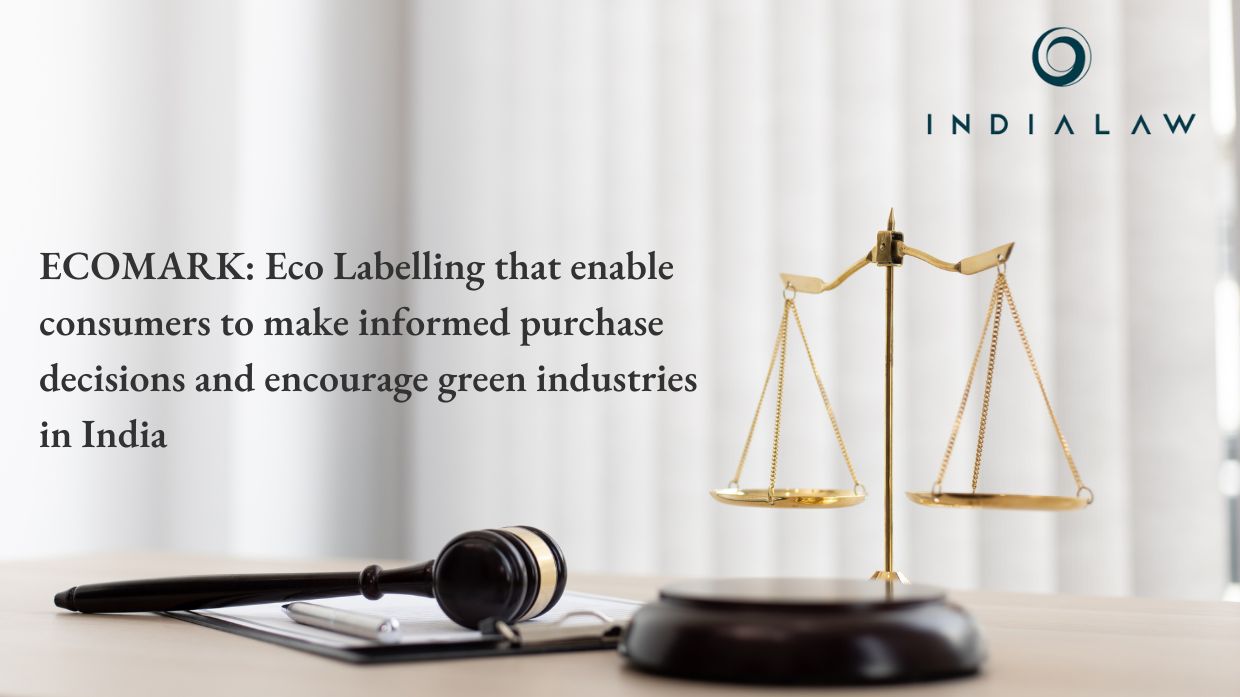ECOMARK: Eco Labelling that enable consumers to make informed purchase decisions and encourage green industries in India

The Ministry of Environment, Forest and Climate Change, Government of India, has announced the “Ecomark Rule, 2024” (Rule) on September 26, 2024. This initiative aims to promote the demand for environmentally friendly products that minimize their adverse environmental impacts, aligning with the principles of “LIFE” (Lifestyle for Environment).
The Ecomark will be awarded to products that meet specific environmental criteria related to resource consumption and impact on climate change, biodiversity, energy use, waste generation, emissions, pollution, and the use of hazardous substances. This Rule is designed to foster energy efficiency, resource conservation, and circular economy practices, while also combating misleading claims about environmental product characteristics.
Conditions for Granting Ecomark
Ecomark is an environmental label awarded to products that meet specific standards set by the Bureau of Indian Standards (BIS). To receive an Ecomark, a product must have a valid license or a certificate of conformity under the BIS Act of 2016. It must also comply with the criteria listed in the First Schedule of the Rule related to environmental impact.
Key Criteria for Ecomark:
- Pollution Reduction: The product should help decrease pollution by minimizing waste and harmful emissions during its life cycle.
- Recyclability: It must be recyclable or made from recycled materials, or both, ensuring that it can be processed again after use.
- Resource Conservation: The product should reduce the use of non-renewable resources, such as fossil fuels and certain minerals, helping to preserve the environment.
- Environmentally Friendly Materials: It should avoid using materials that negatively affect the environment, contributing to sustainable practices.
Factors Considered for Ecomark Eligibility:
When assessing a product for Ecomark, several factors are taken into account:
- Production Process: This includes evaluating the source of raw materials and how the product is made.
- Natural Resource Use: The extent to which natural resources are utilized in the production is examined.
- Environmental Impact: The overall impact of the product on the environment is considered, including the effects of emissions and waste produced during manufacturing.
- Disposal and Packaging: How the product and its packaging can be disposed of or recycled at the end of their life cycle is an important factor.
- Extended Producer Responsibility (EPR): Compliance with guidelines that require producers to take responsibility for their products throughout their lifecycle is evaluated, where applicable.
- Utilization of Waste and Recycled Materials: The use of recycled materials in the product contributes positively to its environmental rating.
- Recycling Suitability: The ease with which the product can be recycled is considered.
- Non-Hazardous Substances: Preference is given to products that use non-hazardous materials instead of harmful substances in their production.
To obtain an Ecomark for a product, applicants must submit an application to the Central Pollution Control Board (CPCB). The CPCB will verify whether the product meets specific criteria within 60 days. If the product complies, the Ecomark will be granted, valid for three years or until criteria change. After three years, holders can apply for renewal, following the same procedure. Each year, by May 31, Ecomark holders must submit an annual report online to the CPCB for the previous year. The CPCB will review these reports and send a summary to the Ministry of Environment by July 31
The Central Pollution Control Board (CPCB) can cancel or suspend an Ecomark if it finds that the holder provided false information or hid required details. The holder will be given a chance to explain before any action is taken. If the holder disagrees with the decision, they can appeal to the Central Government within 30 days. The Central Government may accept late appeals if there is a valid reason. After reviewing the case, the Central Government will make a decision based on the findings of their inquiry.
Entities that have been approved for the Ecomark must clearly display it on their products and any unauthorised display will lead to penal consequences.
Web Portal for Ecomark
The Central Pollution Control Board will create a web portal to:
- Allow people to apply for the Ecomark.
- Enable Ecomark holders to submit annual reports.
- Register Verifiers and auditors.
- Register agencies that monitor compliance with Ecomark Rules.
This portal will streamline the process for managing Ecomark applications and ensuring products meet environmental standards.
Currently manufacturers of the following product categories may apply for an Ecomark ie., Architectural paints and power coating, cosmetics, batteries, lubrication oils, soaps and detergents, paper, food items, packaging material /package, electric/electronic goods, food additives, wood substitutes, aerosol propellants, plastic products and textiles.
In summary, obtaining an Ecomark requires that a product not only meets specific standards of quality and safety but also demonstrates a commitment to reducing environmental harm through its design, production, and lifecycle management. By adhering to these criteria, products can earn this eco-label, signalling their sustainability to consumers.
For any further details please contact rahul.sundaram@indialaw.in
By entering the email address you agree to our Privacy Policy.



